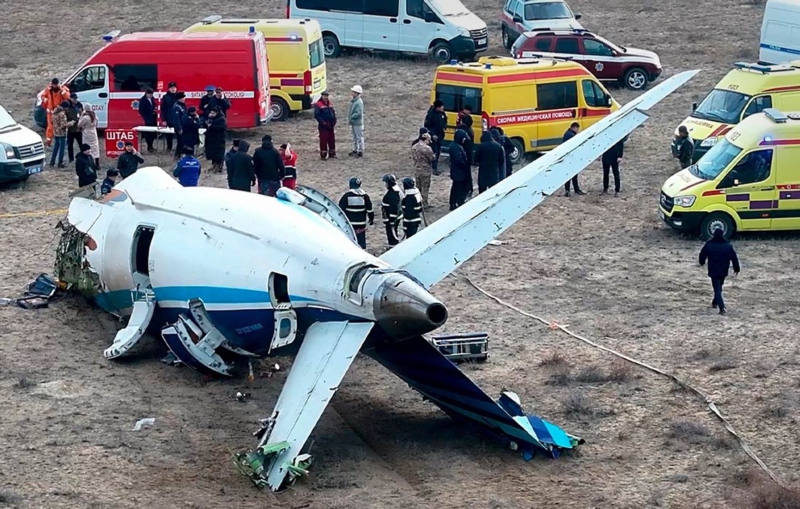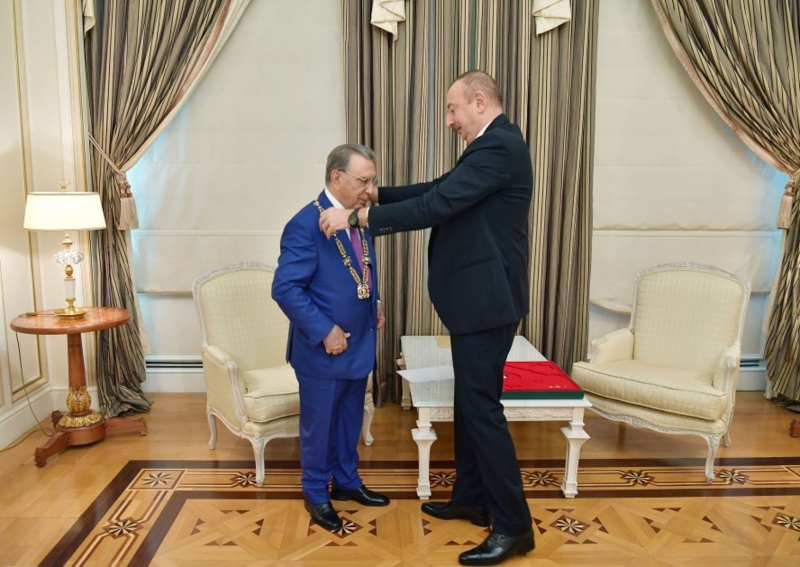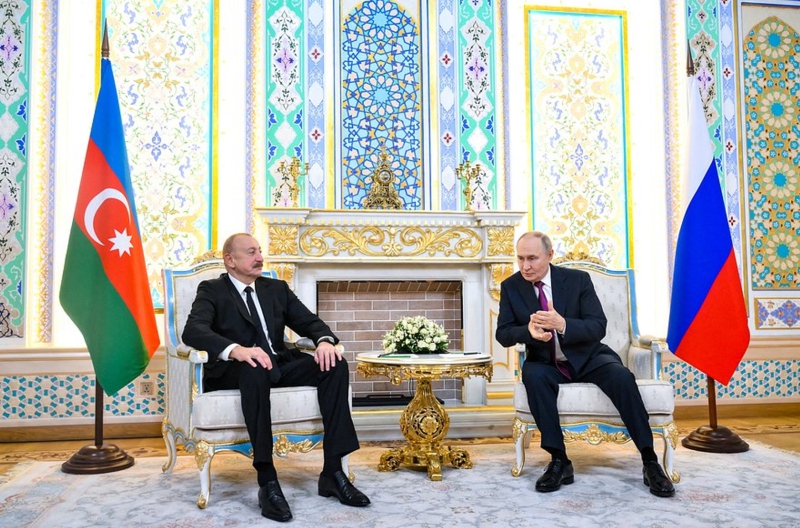On Oct. 22, it was reported that Russia had extradited four Azerbaijani nationals who were on a wanted list back home. Before that, a detained Russian propagandist was allowed to return from Baku back to Moscow. These two developments resulted from the Oct. 9 meeting between Vladimir Putin and Ilham Aliyev in Dushanbe. According to observers on both sides, the talks marked a turning point in the 10-month conflict between the two strategic allies. Yet despite the similarities between the regimes and their leaders, it is too early to speak of lasting reconciliation.
To some extent, Putin was right when he characterized the falling-out between Baku and Moscow as a “crisis of emotions.” The cause was indeed Azerbaijan’s emotional reaction to the plane crash ten months earlier, in which a flight from Baku to Grozny was struck by a Russian anti-aircraft missile, ultimately leading to the deaths of 38 out of the 67 people on board. Notably, on the cold morning of Dec. 25, 2024, another aircraft was in the sky — the Azerbaijani presidential jet Baku-1, which was carrying Aliyev to a CIS summit in St. Petersburg. That plane, too, entered the strike zone of Russian air defenses. After it experienced radio interference, including the loss of its GPS signal, Aliyev ordered the pilot to make an emergency turn back to Baku.
Not his equal to apologize
The abrupt turnaround of the presidential aircraft had already sparked numerous conspiracy theories suggesting that an attempt on Aliyev's life had been in the works. Allegedly, the plan failed, and a passenger plane accidentally ended up in the strike zone. Interestingly, this version gained traction on social media among the Azerbaijani opposition, and also in Armenia. Azerbaijani officials, however, have carefully avoided any mention of the incident involving the presidential jet.

Moreover, when the Azerbaijani news agency Turan published an article on Feb. 5 about external radio interference affecting the presidential aircraft, it immediately provoked a harsh reaction from the authorities. Although Turan quickly removed the article from its website and apologized, on Feb. 13 the outlet was forced to suspend its operations. At the time, the Azerbaijani authorities were extremely sensitive about the issue.
On the other hand, Aliyev was deeply offended that Putin did not consider it necessary to call him immediately and apologize for the AZAL plane tragedy — and, of course, for the distress the Azerbaijani president experienced that day. Instead, Ramzan Kadyrov, the head of Chechnya, tried to call Aliyev and offer apologies on Putin’s behalf — which only enraged him further. By delegating the call, the Russian dictator made it clear that he did not see Aliyev as his equal — a revelation all the more striking given that just a few days earlier, on Dec. 18, 2024, Aliyev had told propagandist Dmitry Kiselyov that he and Putin were “in the same boat” when it came to their views and values.
Aliyev was deeply offended that Putin did not consider it necessary to call him immediately and apologize for the AZAL plane tragedy
It is unlikely that Aliyev was purposefully seeking a confrontation. His entire history of relations with Putin suggests that he feels far more at ease in the company of the Russian leader and other authoritarian figures than he does when dealing with Western, especially European, politicians. Aliyev was prepared to treat the plane crash as a tragic accident as long as Putin was willing to offer an apology — he even cited his own apology for the downing of a Russian helicopter in November 2020 as a precedent. At the same time, with the firm backing of Turkey — which had helped him establish ties with the United States and had actively supported him in the most recent war in Nagorno-Karabakh — Aliyev had no intention of yielding either.
Putin, with his colonial mindset, is overly sensitive to any signs of disloyalty from the post-Soviet states. The very idea of apologizing to the leader of a country he still considers part of his own “sphere of influence” strikes him as a risky move. It is precisely because of this symbolic significance that Aliyev’s demand for an apology received broad support not only within Azerbaijani society, but also across other post-Soviet states — especially in Central Asia. Many there followed the conflict closely, seeing themselves as next in line for a reckoning with Russia.
Central Asia followed the conflict closely, as many in the region see themselves as next in line for a reckoning with Russia
Geopolitical circumstances — including the growing U.S. role in the South Caucasus and the Azerbaijani-Armenian agreements signed in Washington this past August — forced Putin to issue a formal apology and ease tensions with Aliyev. Yet there is little sign that his attitude toward the former Soviet states has changed. It is no coincidence that in Dushanbe, Putin broke protocol by declaring, “Azerbaijan is a Russian-speaking country.” He apparently failed to realize just how furious a reaction this would provoke.
The Ramiz Mehdiyev case in the Russian context
Amid optimistic statements about a potential thaw in Russian-Azerbaijani relations, news broke on Oct. 14 that 87-year-old Ramiz Mehdiyev, the former head of the Azerbaijani presidential administration, had been arrested. Mehdiyev was charged with attempting to assassinate President Aliyev, along with counts of treason and involvement in an attempted coup.
The news triggered a wave of conspiracy theories about Russian-Azerbaijani relations. After all, such serious charges were brought against a man who had played a significant role in the country over the past several decades. Mehdiyev was often referred to as Azerbaijan’s “gray cardinal,” and, most importantly, was considered to be the leader of pro-Russian forces in the country. In effect, the authorities had arrested — or, more precisely, attacked — a symbol of Kremlin influence in Azerbaijan.

Remarkably, even a week later, no government body had confirmed either the arrest or the filing of any charges against Mehdiyev. The authorities remain steadfastly silent while simultaneously feeding increasingly mind-boggling versions of events into the state-controlled media.
One of these alleges that Mehdiyev was planning to assassinate the president and stage a coup in the country. According to an “anonymous but reliable source,” Mehdiyev supposedly drafted and sent a plan for Aliyev’s assassination and a coup in Azerbaijan to the Kremlin. The plan was to be carried out with Russia’s support, but Putin allegedly rejected the proposal and handed Aliyev all the information about the conspiracy and its members at the meeting in Dushanbe.
Interestingly, this time the authorities took a course completely different from the crackdown on Turan in the spring, allowing government propagandists to bring up the issue of the radio interference affecting Aliyev’s plane in December 2024. According to this version, the disruption of the signal was carried out with the assistance of “certain military circles” in Russia. However, a mistake occurred: instead of the presidential aircraft, a civilian AZAL plane that was following the same route 30 minutes earlier was shot down. The government propagandists even vaguely hinted that they viewed Putin’s behavior at the Dushanbe meeting as cynical: “He came not to repent, but to sell salvation. In return, he got a thaw and silence.”
Azerbaijani propagandists even vaguely hinted that they viewed Putin’s behavior at the Dushanbe meeting as cynical
This version was met with such sarcasm by Azerbaijani society that Aliyev’s team had to issue an updated explanation through the media about the reasons why Russia had “handed over” Mehdiyev. Allegedly, two factions had formed within the Russian leadership: hardliners, who were mainly connected to the security services, and proponents of fostering pragmatic cooperation. According to this narrative, Putin sided with the second faction, which is why he supposedly rejected the plot against Aliyev and exposed the conspirators in Dushanbe.
It turns out that Putin, as a “pragmatist,” not only informed Aliyev about the planned coup but also handed over all information about his agents in Azerbaijan — all in the expectation of a “thaw and silence.” Yet instead of gratitude, pro-government Azerbaijani journalists, politicians, and experts have been attacking Russia and the country’s pro-Russian forces for a week now.
When accusing someone of treason, Azerbaijani propagandists usually point fingers at the Armenians or Iran. Yet in the Mehdiyev case, none of them mentioned either of the “usual suspects.” This indicates that the current propaganda campaign is casting Russia itself as Baku's main enemy.
Despite the various implausible narratives circling around Azerbaijan at the moment, the most likely explanation for the Mehdiyev case is tied to the final stage of the power struggle at the top echelons of government — and the ultimate ousting of Aliyev’s father’s old guard by the ruling family. In 2019, Mehdiyev was removed from his post as head of the Azerbaijani presidential administration, and for the past three years he had been retired and under constant, covert surveillance by Azerbaijani intelligence. The current situation appears to be aimed at redistributing Mehdiyev’s and his associates’ assets in favor of the victorious Aliyev family. Still, some may see this case as a signal to the West, particularly the U.S., that Aliyev has distanced himself from Putin — after all, he is holding incommunicado a figure personally connected to the Russian dictator and known as a leader of pro-Russian forces in his country.

